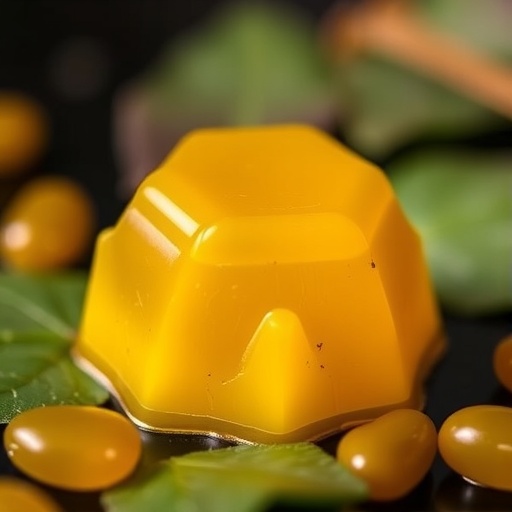Recent advancements in the realm of oncology have consistently emphasized the necessity for innovative therapeutic strategies to ameliorate the adverse effects associated with conventional chemotherapeutic agents. A groundbreaking study conducted by Kalkan and colleagues has highlighted the protective properties of royal jelly in mitigating gemcitabine-induced ovarian toxicity, a debilitating side effect often encountered by patients undergoing treatment for various malignancies. This revealing research opens up intriguing possibilities for supportive therapies that can enhance the quality of life for patients while they endure rigorous cancer treatments.
Gemcitabine, a standard medication in the arsenal against various cancers, particularly pancreatic and ovarian, has been lauded for its efficacy against solid tumors. However, its use is invariably accompanied by a range of side effects, among which ovarian toxicity is particularly concerning. The cellular damage inflicted upon ovarian tissues can significantly hamper ovarian reserve and functionality, leading to long-term repercussions, including infertility. Thus, the quest for a solution that could mitigate such toxic effects has been of paramount importance to oncologists and patients alike.
In their recent study, Kalkan et al. delved into the potential of royal jelly, a nutritious substance secreted by honeybees, to combat the toxic effects of gemcitabine on ovarian tissue. This natural product, known for its myriad health benefits, including anti-inflammatory, antioxidant, and regenerative properties, has garnered attention in various fields of medicine. However, its application in oncology, particularly for ovarian protection during chemotherapy, is a relatively uncharted territory that this study ambitiously sought to explore.
Experimental models using rats allowed the researchers to scrutinize the histopathological changes induced by gemcitabine in ovarian tissue while concurrently assessing the protective effects of royal jelly. The design of the study was meticulously crafted to ensure robust results, with groups receiving varying dosages of royal jelly in conjunction with gemcitabine treatment. This systematic approach enabled the researchers to not only evaluate the direct impact of gemcitabine on ovarian health but also to ascertain the efficacy of royal jelly in providing a protective barrier against this chemotherapeutic agent’s deleterious effects.
Results from the study were compelling. There was a notable preservation of ovarian architecture and follicular integrity in the groups treated with royal jelly compared to those that did not receive this natural supplement. The analysis indicated a significant reduction in the markers of apoptosis and oxidative stress in the ovarian tissues of rats treated with royal jelly alongside gemcitabine. These findings suggest that royal jelly could serve as a potent adjunct in cancer therapy, possibly ushering in a new paradigm where integrative approaches become crucial components of oncological treatment protocols.
The implications of this study extend beyond the immediate protective effects observed in ovarian tissue. By highlighting the potential of royal jelly, the research posits natural substances as viable and effective alternatives or adjuncts to conventional pharmacological interventions for managing chemotherapy-induced damage. This is particularly relevant in an era where patients are increasingly seeking holistic and integrative healing modalities to complement their cancer treatment regimens.
An additional layer to this investigation lies in the intricate composition of royal jelly itself. Rich in vitamins, proteins, lipids, and bioactive compounds, it presents not only a nutritional boon but also a potential reservoir of therapeutic agents that could be harnessed to shield not just the ovaries but various other affected organ systems during chemotherapy. The study opens doors to further exploration into other natural products that could offer similar protective benefits against chemotherapy-induced toxicity.
Moreover, as the medical community increasingly acknowledges the significance of preserving fertility in cancer patients, the findings from Kalkan et al.’s study arrive as a beacon of hope. The prospect of a simple dietary supplement aiding in the protection of reproductive health during rigorous cancer treatments could revolutionize patient care, allowing individuals to pursue family planning options even amidst the challenges posed by their illnesses.
The outcome of this study raises pertinent questions about the integration of botanical and nutraceutical compounds into established treatment frameworks. Future research will undoubtedly be required to elucidate the underlying mechanisms through which royal jelly confers its protective benefits. Mechanistic studies could provide deeper insights into the cellular pathways involved, paving the way for the development of more targeted therapies that could be utilized alongside traditional chemotherapy.
Equally important is the research’s contribution to understanding patient empowerment in managing their health. By advocating for the inclusion of natural products in supportive care protocols, such studies encourage patients to engage actively with their treatment options. Education about safe and effective supplemental therapies can foster a collaborative approach between patients and healthcare providers, aiming for comprehensive care that addresses both efficacy and quality of life.
In conclusion, the study conducted by Kalkan et al. represents a pivotal advancement in the understanding of how complementary therapies can serve a critical role alongside traditional cancer treatments. The promising results surrounding royal jelly’s ability to mitigate gemcitabine-induced ovarian toxicity are a remarkable testament to nature’s potential in medical science. As research in this domain continues to evolve, it stands to reason that more integrative approaches to cancer care will emerge, ultimately enhancing patient outcomes and experiences during one of the most challenging times in their lives.
This exploration into the protective effects of royal jelly against chemotherapy-induced toxicity not only elucidates a novel role for a natural product in oncology but also emphasizes the need for ongoing research into integrative treatment options that can support patients holistically. As scientists and clinicians work in tandem, the potential for a future in cancer care that embraces both conventional and complementary strategies appears increasingly promising.
Subject of Research: Investigating the protective effects of royal jelly against gemcitabine-induced ovarian toxicity in rat models.
Article Title: Royal jelly alleviates gemcitabine-induced ovarian toxicity: an investigation on rat models.
Article References: Kalkan, K.T., Yalcin, B., Yildiz, H.T. et al. Royal jelly alleviates gemcitabine-induced ovarian toxicity: an investigation on rat models. BMC Complement Med Ther 25, 264 (2025). https://doi.org/10.1186/s12906-025-05013-7
Image Credits: AI Generated
DOI:
Keywords: Chemotherapy, royal jelly, gemcitabine, ovarian toxicity, oncology, integrative medicine, reproductive health.




